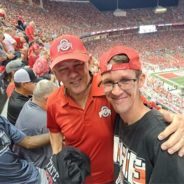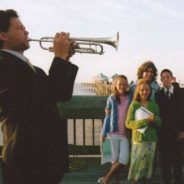Snapshots of Dementia: Tired Out
Photo by Chris Saur on Unsplash I anticipate this being a short post because, well, I’m tired. That description still applies to me too often, but I know it also applies to many of my fellow care partners—for all sorts of reasons. Some of my exhaustion is my fault. I make choices, such as I did today, to do outside activities with Tom. But taking time off during the day usually means I have extra work to do in the evening. As a normal part of our evening, I walk after dinner while watching TV with Tom. We used to walk outside, but his leg and back pain make that impossible right now, and I can’t leave him alone while I walk. Still, he’s happy to share something he enjoys with me, and I’m happy to keep up my steps. Tonight, I stopped walking at about 9 and came back to edit some articles—and still had this blog to write. Tom went to bed about 9:30, so I had to stop, give him his medicine and help him get settled for the night. But I digress. Probably because, well, I’m tired. For more than two weeks now, Tom has fallen into a pattern of waking up early—”late” for him right now is 5:30 a.m—and not going back to sleep. Sometimes he’s gotten up as early as 3 a.m. Sleep disturbances have become a regular part of our dementia journey. Tom has taken medication to help him sleep since soon after diagnosis, and we’ve added/changed medications (prescriptions along with melatonin) here and there in response to episodes of extreme unrest. This is the third time in 2022 that we’ve gotten into a cycle that has him waking up earlier and earlier. That gets complicated for several reasons. If he wakes up early, he tends to nap later on. When he naps, he’s not as tired at night, so he wakes up early again the next day. You get the picture—and well, I’m tired. I’ve also become a light sleeper now that I’m a care partner. Much like a mother with a newborn, I keep one ear out for Tom and almost always know when he gets up to use the bathroom or to stay up. I listen to make sure he’s settled into his recliner. So far, he hasn’t tried to take a walk, eat, or even make coffee when he gets up early; he simply goes to his recliner and starts his morning routine of reading his Bible, playing games on his iPad and, when it begins, listening to “Morning Edition.” (Interestingly, although we’ve lived in South Carolina for nearly three years, he prefers the Orlando public radio station he listened to when we lived in Florida—a comfort-zone behavior like the others I’ve mentioned here and there.) When you have dementia, you live more and more in the moment. Living in the moment means you rarely think, Oh, I should be quiet. My wife is trying to sleep—or, if you do, you don’t have the capacity to be quiet. Although he does play the radio at a low volume, he doesn’t realize that activities such as opening and closing drawers or leaving lights on will bother me. Today, he did something he rarely does anymore and went...
read moreSnapshots of Dementia: What I Wish I’d Known
Photo by Aaron Burden on Unsplash What is something that you wish you’d have known early on, or wished you’d have done or put in place? A woman whose husband is newly diagnosed with young-onset dementia, early stage, asked this question of other spouses/caregivers, and it moved me to think—and now, to write. That’s part of the reason behind my blog, I thought. But her question also prompted some specific responses. 1. I wish I’d known more about dementia early on so I could have pushed sooner and harder for a diagnosis. No (because some of you will think this), I’m not beating myself up. You can only know what you know. But if I had understood sooner that dementia encompasses much more than memory problems, and especially that it can have various effects even while the affected individual still performs well on standard cognitive tests, I wouldn’t have accepted the “No, he doesn’t have dementia. Come back in a year” responses that I heard for more than two years. 2. I wish I’d known that dementia would change more than Tom’s mind and memory. Even before he was diagnosed, I noticed that he had lost his sense of smell, although I didn’t know that was a common symptom of dementia (no, not just of COVID-19). I noticed some obsessive behaviors. I noticed him having increasing trouble finishing tasks he started. I noticed him withdrawing from family and failing to initiate conversations. And I noticed a whole host of other problems, many of which I’ve written about on this blog, that I never knew had a thing to do with dementia—but they did, and they do. 3. I wish I’d known the true value of narrative. Although I make my living from story, I dismissed its worth. Neurologists and others want and need objective ways to measure symptoms and determine diagnoses, and I understand that. But I also believe strongly that they must consider reports from the individual and (because many people living with dementia, or LWD, often have, as Tom did, anosognosia, a lack of awareness of their symptoms) from those closest to them. Early on, the most supportive doctors we had were the ones who listened and took notes on what I reported. The least supportive were those who dismissed my concerns because the objective testing did not at the time support our subjective experience. And yes, the objective matches the subjective now. But why did we, and why do so many others, have to wait until their loved one is midstage in the disease before medical personnel will agree that there’s a serious problem? 4. I wish I’d known how many others were trapped in the same sea of uncertainty as we were. Since beginning this blog, I’ve had many people comment publicly and write me privately to tell me of their similar experiences. I write not out of some deep inner desire to spill my (or my husband’s) stuff or, in effect, to share the bad news. If what I share can help even one person move one step closer to asking the next question or making the next appointment or doing the next right thing, the time and words I share are worth it. And I’m grateful that God has shown me, again and again, that these...
read moreSnapshots of Dementia: Sadness, Slowly
(Image by Mylene from Pixabay) I hope this blog gives you as many hopeful, joyful snapshots of dementia as sad ones. But as I sit, alone again, in a quiet house after Tom’s early bedtime, I’m thinking of a term my dear friend and fellow writer Tracey Pratt taught me: anticipatory grief. That’s typically a type of grief that occurs before someone dies, sometimes (as in Tracey’s case with her only daughter) years before the death occurs. As she worked on the initial chapters of her book on the topic, Tracey taught me that anticipatory grief is a genuine and difficult emotion, and each person’s journey is “unique, normal, and significant,” as she puts it. What neither she nor I knew was that I would, all too soon, experience anticipatory grief myself. I remember the weight of shock that slammed into me when I read that dementia often results in death. Before dementia touched our family, I saw it as something that often happened as people moved toward the end of life, but I never thought of it as a killer. Although it’s very possible that Tom could die of something else, the various types of dementia are considered terminal. The destruction they cause to brain and body can and will ultimately result in death. Learning, understanding, and living that truth over the past few years—especially while Tom remains largely unaware—has resulted in our family’s experience of anticipatory grief. The sudden loss of a spouse hurts. I have two close friends who have had that experience in the past few years, and I’ve watched their gut-wrenching grief. But losing a spouse bit by bit hurts too. Although our family has had some wonderful times to celebrate since Tom’s diagnosis, we’ve also had some times of deep pain. I say “we” because, as you could tell if you read our son’s recent post, Tom’s dementia hurts our entire family. My father died more than ten years ago, but like many others who mourn the loss of a loved one, I still get hit with a wave of grief when something reminds me of him. This happens with anticipatory grief too. Some of my recent, silent grief-moments include: —Listening to Tom ask me how to spell a simple four- or five-letter word and wondering how much longer he will be able to play the word games he still enjoys. —Taking over one more simple task because there’s one more thing he can no longer do and wondering, What next? —Hearing Tom get hopelessly off-track as he shares his thoughts in Sunday school and wondering how much longer he’ll enjoy the class at all. —Seeing his delight over the smallest pleasures—a dinner he enjoyed, a joke that made him laugh, a victory in his online golf game—and wanting to give him many more special moments. —Hearing Tom get suddenly agitated and loudly critical about a mistake at a community choir rehearsal and wondering if it’s time to stop attending. —Seeing our brand-new grandson, only hours old, for the first time over video chat and noticing how Tom barely looks up from his iPad. —Watching Tom in person with that brand-new grandson and wondering how much of his grandpa this little boy will get to know. Anticipatory grief is real. While not dwelling on it, I...
read moreSnapshots of Dementia: Trumpets and Touchdowns
by Andrew Pieper The Ohio State fight song rang out across the soccer field as hundreds of band members marched in unison, performing the iconic Script Ohio a mere fifteen feet in front of my dad, who sat on his walker, smiling and tapping his hand to the beat. Dementia has stolen many things from him: walking without pain, remembering what we were going to do that day despite having the conversation several times before, even constructing sentences at times now proved difficult for one of the most intelligent and humorous human beings I’ve had the privilege to know. Indeed, the list of things that are different with my dad is much longer than the things that have stayed the same over the span of the past few years. However, one of the things on that short list is music. He hasn’t lost a beat, literally. His doctors told us music will probably be one of the things he keeps the longest, simply because it’s been such an integral part of his life for so many decades. Upon hearing this news a year ago, I decided to buy a trumpet and take up playing again after giving it up in middle school, and we’ve been able to practice and talk music together. It’s really something to see how often on my weekly video chats with my parents, my dad is quiet and disengaged, but if I start talking about music, he instantly comes back. One time, I was describing a song, “So it goes A, A, B, C . . .” and without having any music in front of him, he corrected me right away, saying “Oh, that B is a B flat.” He just knew because it’s part of who he is, just like tapping his hand to the beat of the band. It wasn’t something conscious; it’s just part of him. We had driven over 500 miles across five states for this: to see the pride of the Buckeyes, the Ohio State University Marching Band, practice and then perform in a primetime game on a clear Saturday evening. (My mom is the Ohio State graduate, but Dad and I have become equally big fans.) I had emailed earlier in the week with Christopher Hoch, the band director, asking him what I should do to provide my dad with the best music experience possible. He was very gracious, telling me the time and place where they practiced and what to expect on game day. It wasn’t the easiest trip. From constantly reminding Dad what time we were doing things to changing out pain patches on his back, I devoted my full-time attention to making sure he had everything he needed to be safe and comfortable. Despite parking as close to the stadium as possible and arriving several hours prior to kickoff to beat the hundred thousand-plus fans coming to the game, it was still a long walk to the stadium. But I’ve found worthwhile things rarely come easily. As the band practiced in front of us and I walked around taking photos and recording video, I was having a hard time getting a clear picture. It wasn’t my camera or the lens; that image was crystal-clear. The vision problem was with me as tears of happiness welled...
read moreSnapshots of Dementia: ‘He’s Just Different Now’
Tom plays his trumpet for an Easter sunrise service, c. 2006. Three snapshots. Three brief glimpses over the past week that, like the rest of my snapshots, help show you what life is like for a family living with dementia. Although Tom is the one LWD, in some ways, all those who interact with him are LWD as well. And that’s especially true for me as his care partner (for more on this term, see here). FRIDAY AFTERNOON: GRANDPARENTS’ DAY We took off in the middle of the day to visit our grandson’s school (he just started 4K) for Grandparents’ Day. Pre-dementia, this would have been an easy and enjoyable trip. With dementia, it was enjoyable and stressful, including: — Leaving later than I planned because no matter how early I get Tom started, it seems he needs more time. — Arriving to a crowded parking lot and ignoring Tom’s demand that I double-park. Because of his leg and back pain, I would like to have dropped him off at the door, but I knew he might not remember to wait for me. We had to park across a two-lane highway and walk down a small hill to the school. — Watching Tom make a beeline for the cookie table as soon as we entered the cafeteria (first Grandparents’ Day stop). All the other grandparents were waiting in line, so it felt a little awkward, but it didn’t cause a problem. — Because God providentially brought our grandson’s other grandparents there at the same time, we entered his classroom together. Lincoln’s delighted “Nana and Papa! Grandma and Grandpa!” made everything worthwhile for all of us. — Following Lincoln through two crowded hallways so he could show us the STEM room. With a very active almost five-year-old and Grandpa on a walker, this was challenging enough, but it became even more so when Tom left for the restroom as soon as we arrived. Somehow, I was able to corral Tom, have Lincoln escort us, and return to the STEM room and then his classroom with no mishaps beyond my own elevated heart rate. — Returning to the classroom to learn that his teacher and his other grandparents had been concerned about our long absence. I found myself apologizing for a situation I couldn’t have controlled, and I thought: This is who he is now. He can’t plan ahead, so I need to learn to expect the unexpected. I also need to adjust the things we do together—or ask for more help along the way. He’s still Tom; he’s just different now. And it’s OK. WEDNESDAY EVENING: Tom has started helping with a children’s choir at our church. This came at his initiative; he has led many similar choirs over the years. Because music is so important to him, I thought it might be a good outlet and a way to give him another significant task. But it hasn’t turned out the way I’d hoped. And evenings can be a challenge for those LWD. During the practice time, I stay in the background, allowing him to lead alongside the children’s minister. So far, he’s more passive than active, watching and listening to the kids but not even trying to direct. He licks his lips constantly as he stares down at the music. The first night, he was...
read more







